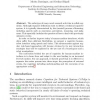Free Online Productivity Tools
i2Speak
i2Symbol
i2OCR
iTex2Img
iWeb2Print
iWeb2Shot
i2Type
iPdf2Split
iPdf2Merge
i2Bopomofo
i2Arabic
i2Style
i2Image
i2PDF
iLatex2Rtf
Sci2ools
141
click to vote
HCI
2009
2009
Statistics-Based Cognitive Human-Robot Interfaces for Board Games - Let's Play!
Abstract. The archetype of many novel research activities is called cognition. Although separate definitions exist to define a technical cognitive system, it is typically characterized by the (mental) process of knowing, including aspects such as awareness, perception, reasoning, and judgment. This especially includes the question of how to deal with previously unknown events. In order to further improve today's human-machine interfaces, which often suffer from deficient flexibilities, we present a cognitive humanrobot interface using speech and vision. The advancements against regular rule-based approaches will become obvious by its new interaction strategies that will be explained in the use case of a board-game and a robot manipulator. The motivation behind the use of cognition for human-machine interfaces is to learn from and adapt to the user leading to an increased level of comfort. For our approach, it showed proof that it is effective to separate the entire process into th...
Cognition | HCI 2009 | Human Computer Interaction | Human-machine Interfaces | Regular Rule-based Approaches |
| Added | 18 Feb 2011 |
| Updated | 18 Feb 2011 |
| Type | Journal |
| Year | 2009 |
| Where | HCI |
| Authors | Frank Wallhoff, Alexander Bannat, Jürgen Gast, Tobias Rehrl, Moritz Dausinger, Gerhard Rigoll |
Comments (0)

